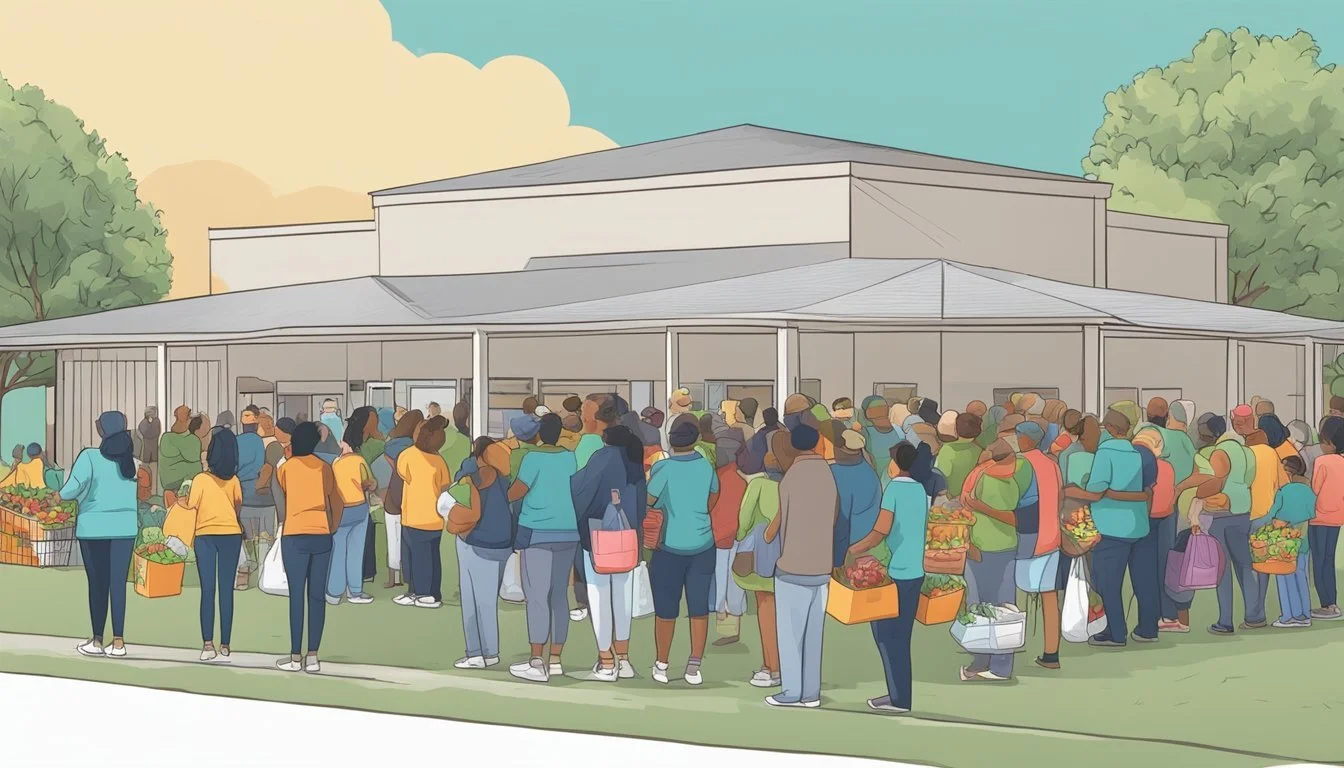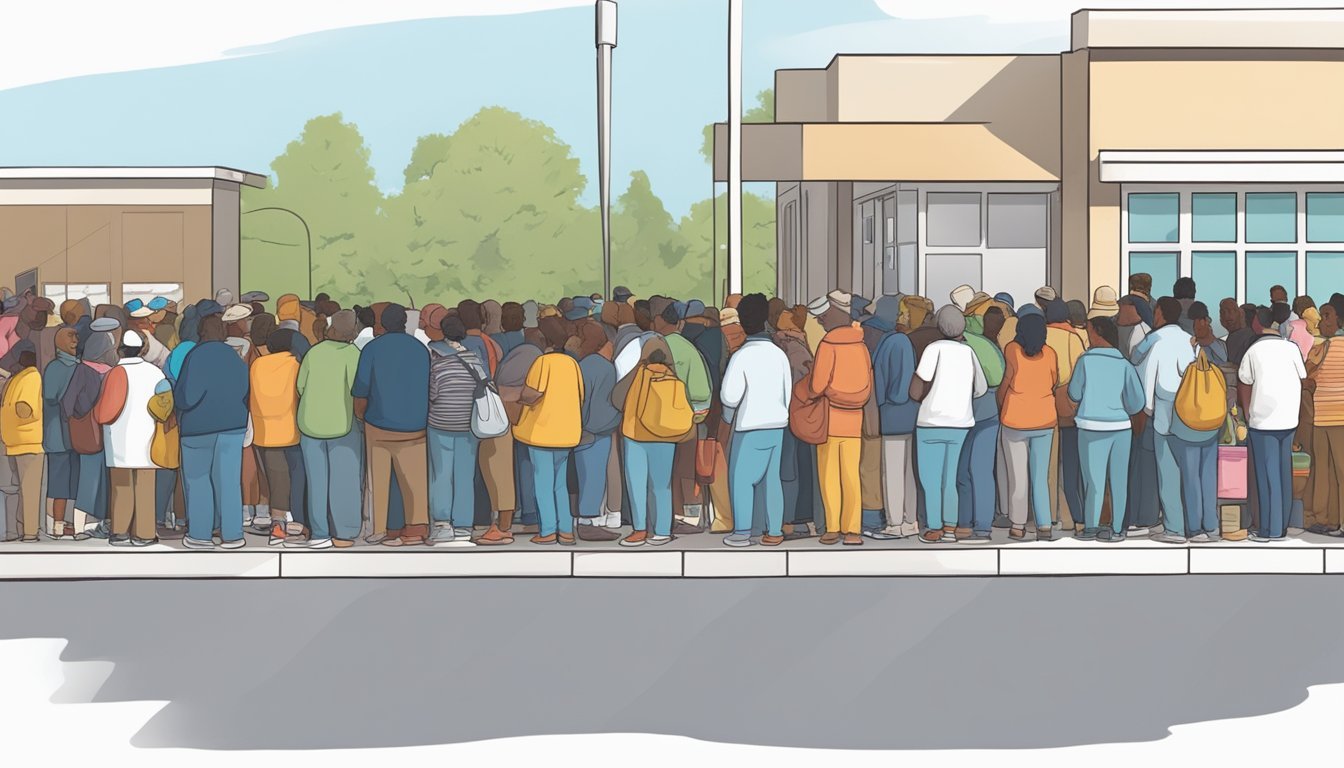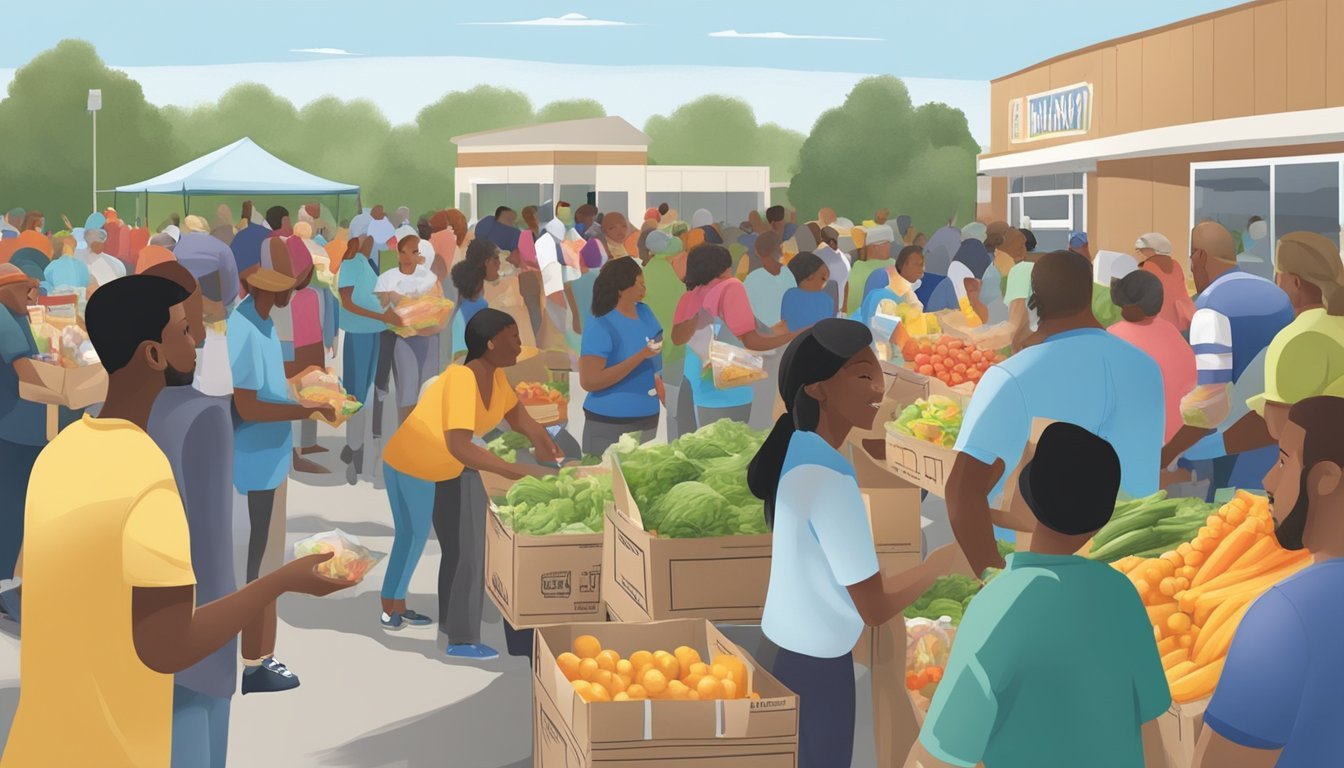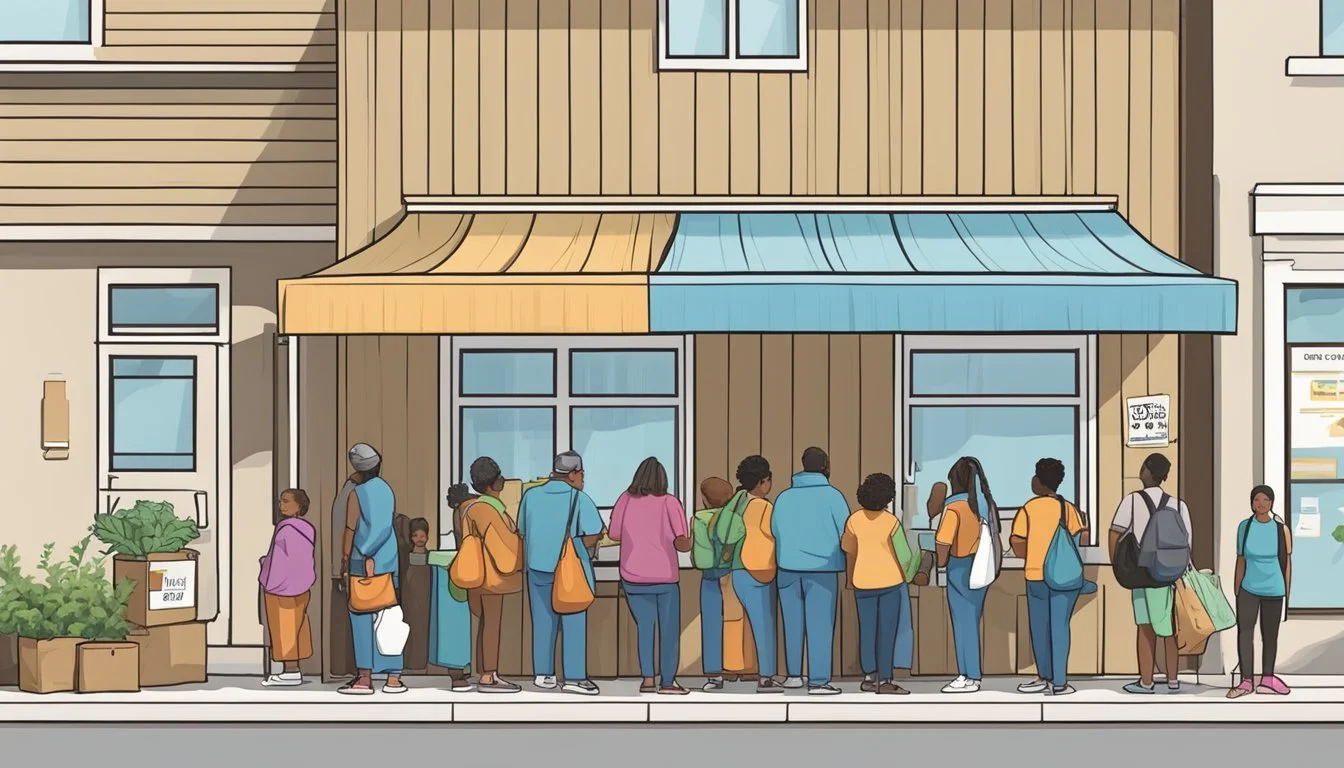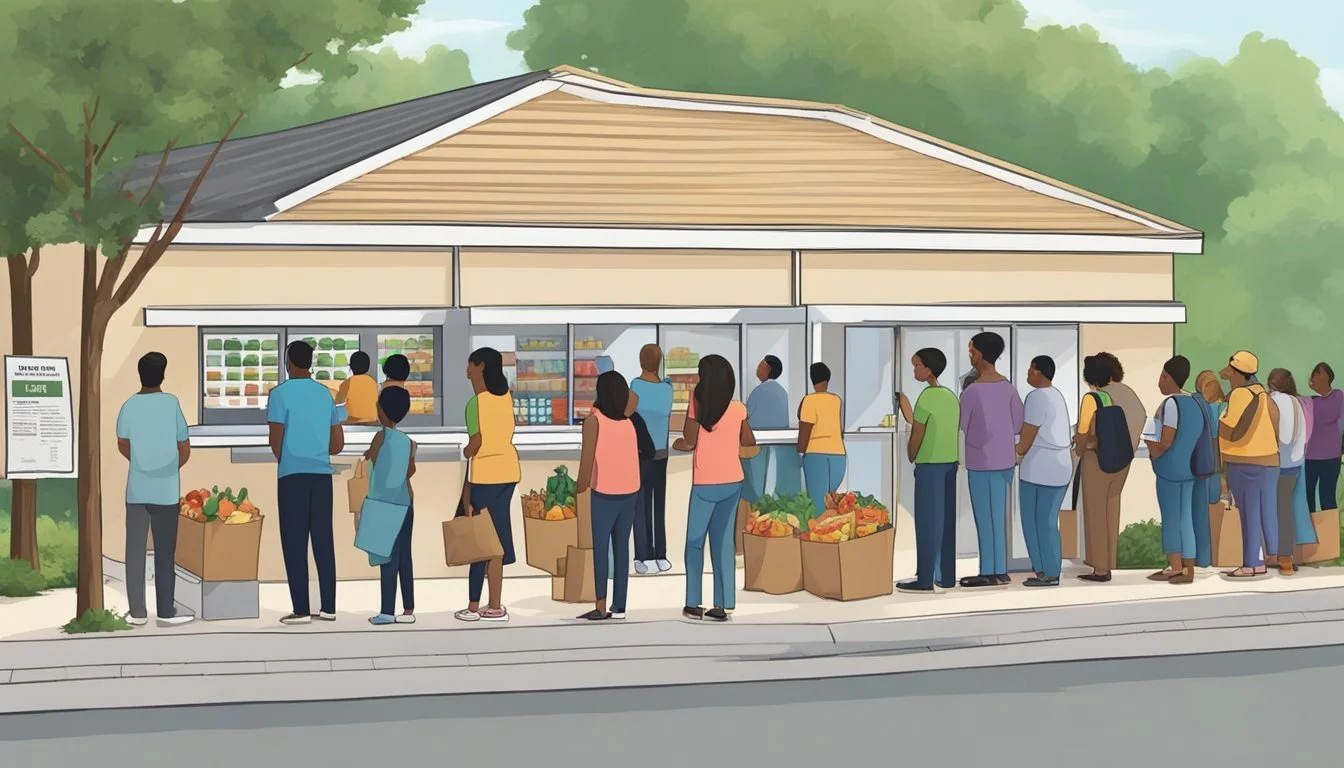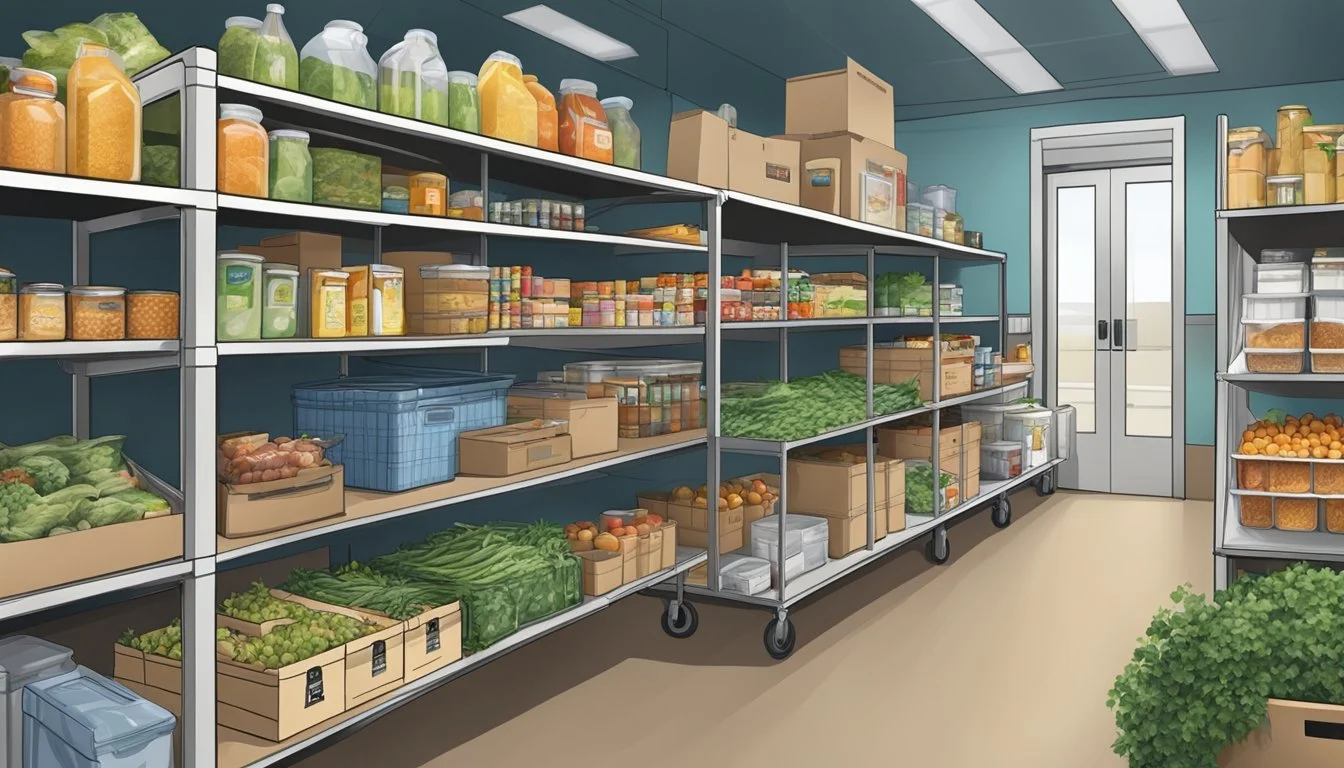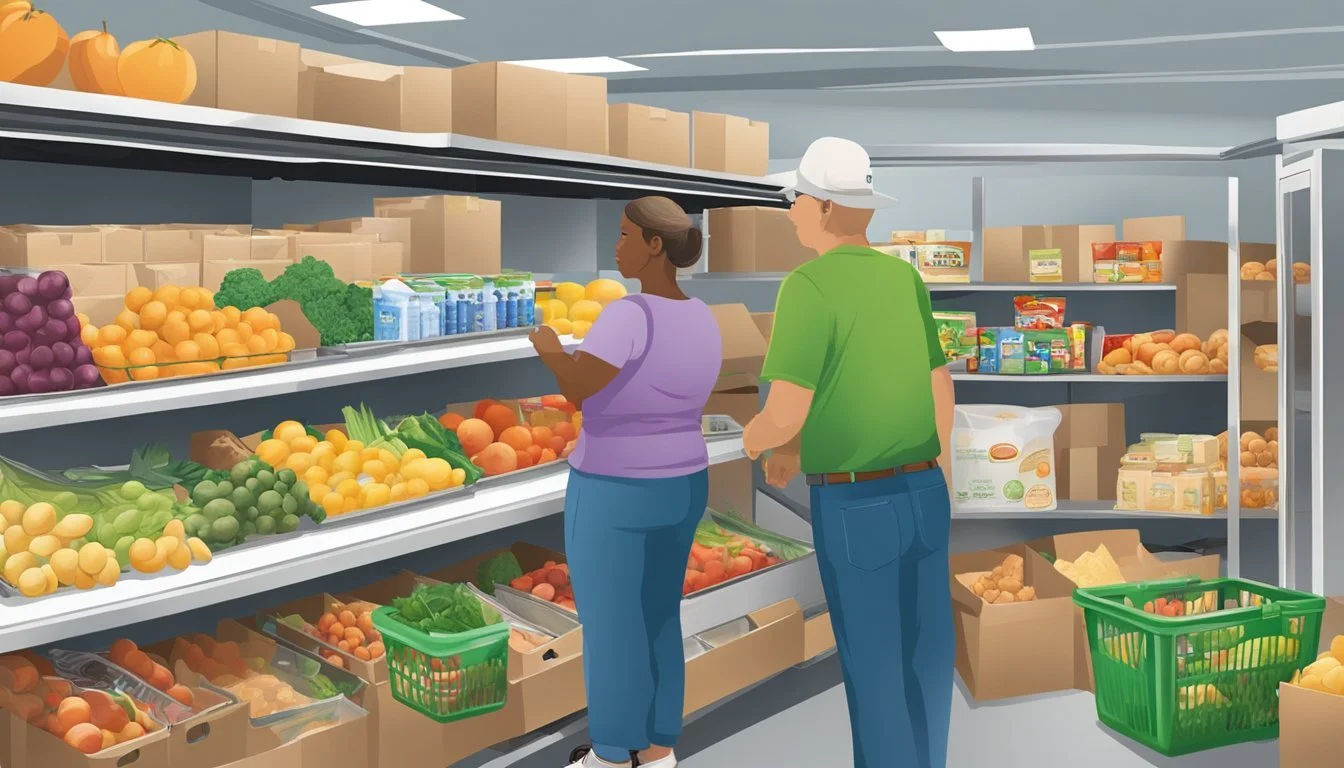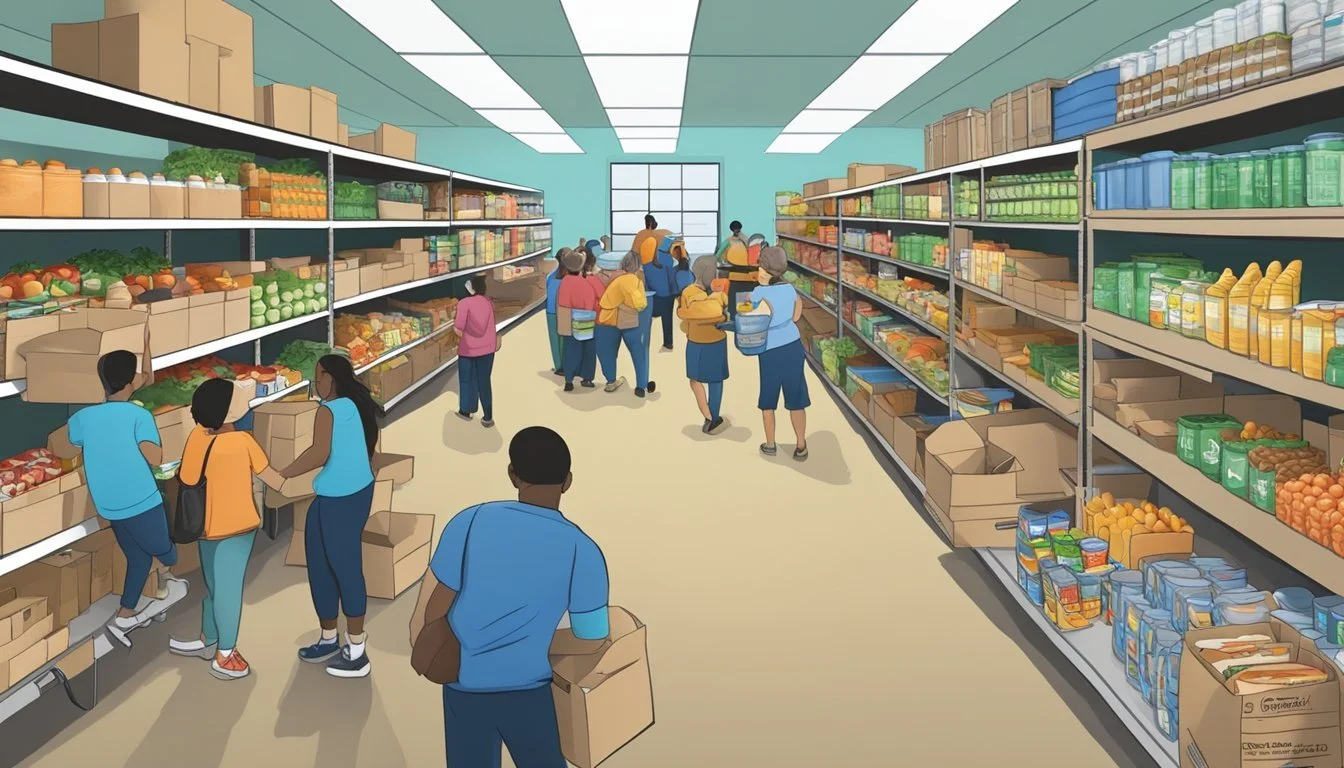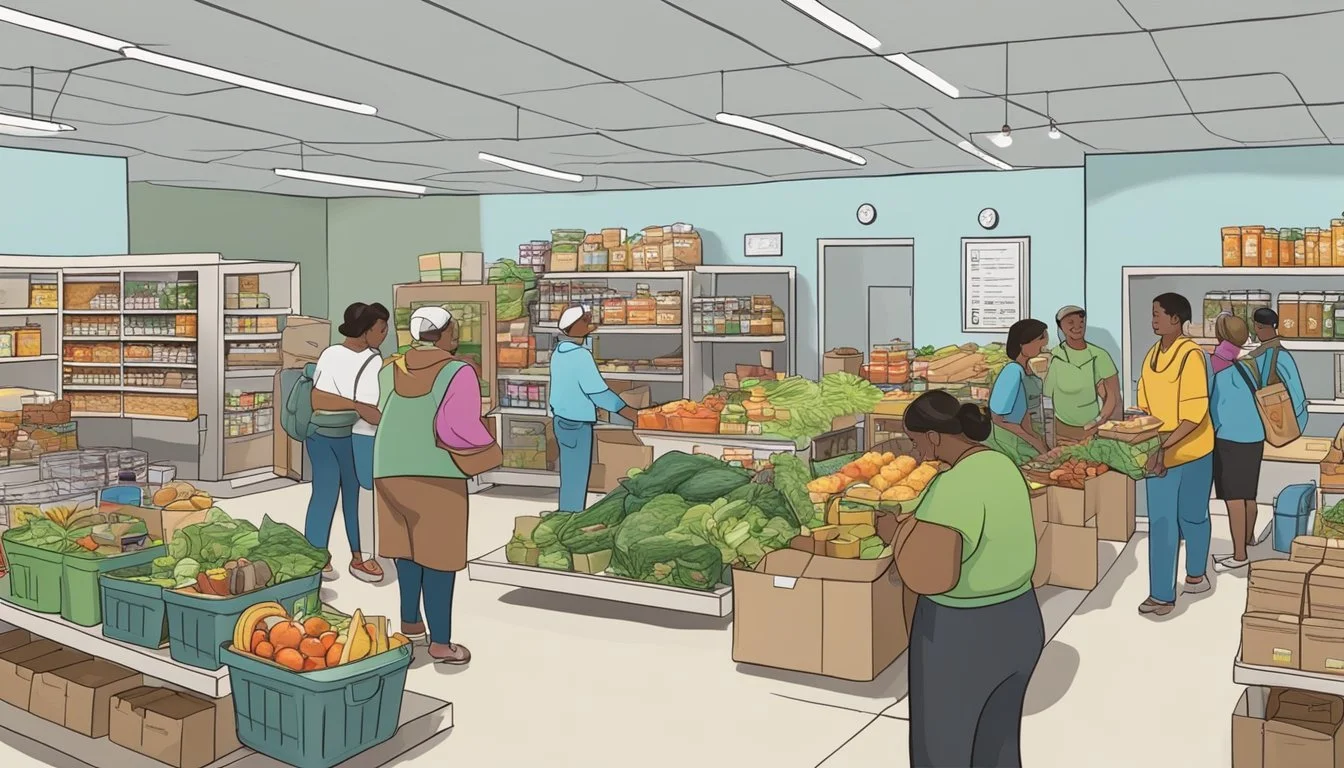Free Groceries and Food Pantries in Montgomery County, Texas
Accessing Nutritional Support Services
This Article is Part of Our Guide on Free Groceries in Texas
In Montgomery County, Texas, a vast network of food pantries provides essential support to residents facing food insecurity. These pantries are a crucial resource, offering a range of services from providing immediate food assistance to helping individuals and families navigate and access public aid programs. They operate with the goal of not only addressing the immediate need for food but also helping to establish long-term food security for those they serve.
The food banks and pantries in this community are designed to be accessible and accommodating, ensuring that residents can find the help they need close to home. Local entities, including the Montgomery County Food Bank, play a pivotal role in distributing food to a variety of partner agencies throughout the county. These partnerships are key to reaching a broader population and making food assistance available to a larger number of people in need.
Moreover, many of these food assistance programs incorporate special services tailored to the unique needs of different groups such as seniors and children. For example, some food banks deliver nutritious groceries directly to the homes of seniors, while others work with schools to ensure that children have access to meals. This holistic approach to food assistance in Montgomery County exemplifies the community’s commitment to supporting its residents through thoughtful and effective programs.
Understanding Food Insecurity
Food insecurity remains a critical challenge in Montgomery County, affecting residents’ access to nutritious food and impacting public health. This section explores the prevalence of hunger and the consequences of inadequate nutrition on various groups within the county.
The Issue of Hunger in Montgomery County
Montgomery County has documented cases of food insecurity among its residents, with earlier reports noting that approximately 11% of the county's population faces food insecurity. This challenge touches on various demographics including children, the elderly, adults, and families, manifesting as limited access to enough food for an active, healthy life. The presence of food pantries and community assistance initiatives is a response to address the nutritional needs and ensure food availability for those in need.
Nutrition and Public Health
Nutrition is intrinsically linked to public health outcomes. In Montgomery County, inadequate nutrition can lead to health problems that disproportionately affect food-insecure children and adults. Strategies outlined in the Montgomery County Food Security Plan emphasize improving access to sufficient, nutritious food as a blueprint for enhancing the overall health and well-being of all residents. This involves local businesses, nonprofit organizations, and government agencies working together to create a sustainable and healthy food scene in the county.
Local Food Pantries and Banks
Montgomery County, Texas, provides an extensive network of food pantries and banks offering food assistance to residents in need. These essential services operate through structured channels like the Montgomery County Food Bank, client choice food pantries, and various church-based organizations, ensuring food security for individuals and families.
Montgomery County Food Bank
The Montgomery County Food Bank serves as a pivotal resource in the region, distributing food to over 80 partner agencies across Montgomery County. This central hub works to reach those facing food insecurity through various programs and collaborations with local food pantries.
Client Choice Food Pantries
Client choice food pantries offer a unique service allowing individuals to select their food, similar to a grocery store experience. This model not only provides dignity in the selection process but also ensures that the food provided meets the personal needs and preferences of each household.
Church-Based Food Assistance
Church-based food assistance programs are integral to the local support system, with entities like Sacred Heart Church - Conroe SVDP and First Christian Church Conroe - Food Pantry leading by example. Sacred Heart Church operates a food pantry that caters to the needs of the community, and First Christian Church provides food pantry services to people in several zip codes, including 77301, 77302, 77303, 77306, and 77304. Identification is required for services, with operation hours and additional details typically available via direct contact.
St. John of the Cross Catholic Church also includes a food pantry among its many community outreach efforts, serving as another place of support for those requiring food assistance in Montgomery County.
Resources and Services
Montgomery County, Texas, offers a robust network of food assistance for residents in need. These services include emergency food aid, access to fresh produce and groceries, and nutritious food options.
Emergency Food Aid
Organizations in Montgomery County provide immediate food assistance to individuals and families facing food insecurity. The Montgomery County Food Bank partners with over 80 agencies to distribute food across the county. Residents in need are advised to call ahead to verify pantry hours at 936-271-8800. Assistance is available in the form of food pantries that supply a range of groceries, and hot meals are also prepared and served by volunteers.
Fresh Produce and Groceries
Food pantries like the Community Assistance Center's Client Choice Food Pantry offer a unique shopping experience where individuals can choose from a variety of fresh produce, proteins, and shelf-stable items. This service empowers residents to select food that best fits their dietary needs. The availability of fresh vegetables and fruit ensures that families have access to healthy food options at no cost.
Nutritious Food Options
Nutrition is a key focus, and several food assistance programs in Montgomery County are dedicated to providing not just food, but nutritious options that contribute to a balanced diet. First Christian Church in Conroe, which can be contacted at (936) 756-8186, has a food pantry that offers dairy products, soup, and other essential food items. Nutritious food choices are critical for the well-being of individuals and the community at large, and these services are designed to meet that need effectively.
Volunteer and Donation Opportunities
In Montgomery County, Texas, individuals looking to support their community can engage in volunteer activities or provide donations to help run food pantries efficiently. These actions are essential in maintaining and expanding services that alleviate hunger.
Volunteering at Food Pantries
Montgomery County Food Bank relies on volunteers for various tasks including preparing items for distribution. They offer a structured environment where individuals can contribute to feeding the hungry. Whether one has a few hours to spare or is looking for a more sustained volunteering commitment, the food bank welcomes the support.
Donating Money and Food
Monetary Donations: For those interested in providing financial support, a contribution to the Montgomery County Food Bank can be particularly impactful. With each dollar given, the food bank can create up to four meals, thanks to its efficient use of resources.
Food Donations: Donors can also contribute food items directly to local food pantries. These non-profit organizations typically have guidelines about what types of food they can accept to ensure safety and health standards are met.
Both volunteering and making donations to the Montgomery County Food Bank and similar entities are charitable actions that can have significant effects on the community. These food pantries often have tax exempt status, allowing for monetary contributions to be tax-deductible depending on the donor’s financial situation. Through various programs, they strive to distribute food effectively to those in need while upholding dignity and compassion.
Eligibility and Distribution
Access to food assistance in Montgomery County, Texas, hinges on eligibility requirements and knowledge of distribution methods used by local pantries. This section outlines how individuals can qualify for food assistance and highlights the operational details of food pantry hours and locations.
Qualifying for Food Assistance
Individuals seeking food assistance in Montgomery County must typically meet certain eligibility requirements based on factors such as income, family size, and residency. Proof of residency, often via a valid ID or bill reflecting a Montgomery County address, is usually required. Some pantries may have specific zip code restrictions, serving only those within their designated areas. Applicants are encouraged to directly contact food pantries, as requirements may vary.
Eligibility: Based on income, family size, residency
Required Identification: Driver’s license, bill, or other proof of residency
Zip Code Restrictions: May apply, check with individual pantries
Food Pantry Hours and Locations
Food pantry hours of operation and locations are critical for those in need of assistance. It's advised to call ahead to confirm hours and eligibility criteria. For example, the food pantry associated with First Christian Church operates at specific times and may serve a set range of zip codes including 77301, 77302, 77303, 77306, and 77304. Below is a summarized list of details to consider when planning a visit.
First Christian Church
Address: 3500 North Loop 336 West Conroe, TX 77304
Phone: (936) 756-3554
Hours: Wednesday 9:00am - 11:45am
Confirmation: Call to verify hours and any potential changes
Note: Montgomery County Food Bank collaborates with over 80 partner agencies. It is beneficial to check with the Montgomery County Food Bank or their partners for additional information on food assistance options throughout the county.
Additional Support Services
In Montgomery County, Texas, residents in need can find a variety of support services apart from food assistance. These services are designed to provide a stable foundation in areas critical to maintaining a healthy and safe lifestyle such as housing, healthcare, and essential material goods.
Housing and Utility Assistance
Organizations in Montgomery County offer programs to help with housing costs and utility bills. Community Assistance Center operates to aid individuals and families struggling with rent and utilities, ensuring they have a safe place to call home. They tailor assistance to prevent homelessness and disconnection of essential services like electricity and water.
Health and Medical Services
Healthcare is a vital concern, and there are providers in Montgomery County dedicated to offering medical services to those without insurance or the means to pay. Low-cost clinics and health centers deliver preventative care, vaccinations, and acute medical treatment. These services are crucial in maintaining the well-being of individuals who might otherwise forgo necessary care due to cost barriers.
Clothing and Basic Goods
In addition to food and shelter, access to proper clothing and basic goods is essential. Various non-profit organizations and ministries in Montgomery County provide free or low-cost clothing to people in need, helping to meet basic needs and preserve individual dignity. This support extends to items such as school uniforms for children, job interview attire for adults, and seasonal clothing to protect against harsh weather.
Community Involvement
In an effort to combat food insecurity in Montgomery County, Texas, community involvement has emerged as a cornerstone, with various entities banding together to make a difference. Through local partnerships and organized events, these groups demonstrate a shared mission of compassion and service.
Local Partnerships and Networks
Montgomery County benefits from a strong network of partners working collectively to address hunger. The Community Assistance Center exemplifies this collaborative spirit, acting as a critical player in the fight against food insecurity. This center, along with other organizations, constitutes a network that shares resources and information to maximize their impact.
They foster relationships with local businesses, faith-based institutions, and Volunteers of America to ensure residents have access to nutritious food. These partnerships hinge on a passion to serve and the capacity to leverage each other’s strengths in aid of a common mission.
Events and Food Drives
Throughout the year, Montgomery County witnesses numerous events and food drives that galvanize community support and provide essential food supplies to those in need. These are often spearheaded by local organizations and rely heavily on volunteer support.
A notable instance is the collaboration for large-scale food drives during the holidays and other times of peak need, reflecting the area's dedication to compassion. The collective effort of such initiatives not only addresses immediate food requirements but also strengthens the sense of community and shared responsibility.
Innovative Programs and Campaigns
Montgomery County, Texas, showcases a robust commitment to addressing hunger through various innovative programs and campaigns, demonstrating efficient food distribution and educational initiatives.
Mobile Markets and Pantry Pictures
Mobile markets are transforming how fresh food reaches the tables of those in need in Montgomery County. By hitting the road, these mobile markets ensure that nutritious food is accessible in multiple neighborhoods, especially for residents who cannot reach brick-and-mortar pantries. They often share "Pantry Pictures," which are visual representations of available produce and food items that help recipients make selections even before they arrive.
Surplus Food Distribution
Montgomery County Food Bank harnesses the power of surplus food through its innovative Produce Rescue Center, which has redirected over 19 million pounds of produce since 2017. Turning potential waste into sustenance, this program not only combats food insecurity but also contributes to environmental sustainability by reducing landfill waste.
Educational and Wellness Programs
The county's food assistance initiatives go beyond simply providing food; they incorporate educational and wellness programs aimed at fostering long-term health. Participants can engage in nutrition education, budget-friendly shopping tips, and healthy cooking classes, all designed to enhance their ability to make informed food choices and sustain a wholesome lifestyle.
Access and Contact Information
Residents in Montgomery County, Texas seeking food assistance can find support through various local food pantries. It is essential for individuals to call ahead to confirm operating hours and potential requirements, such as providing identification.
First Christian Church Conroe offers a food pantry service:
Hours of operation: Wednesday 9:00 AM - 11:45 PM
Service Area: Zip codes 77301, 77302, 77303, 77306, 77304
Contact: (936) 756-3554
Website: Unavailable
The Montgomery County Food Bank collaborates with over 80 partner agencies providing comprehensive food aid. They recommend verifying the latest pantry details by phone:
Contact: Directory unavailable
Website: Unavailable
Additionally, Montgomery County Food Bank Programs support school districts with kid-friendly food assistance through mobile markets and school pantries:
Affiliation: 70+ schools in six districts
Programs: School pantries, mobile markets, backpack food bag program
Contact: Unavailable
Website: Unavailable
For immediate assistance, individuals may refer to the following organization:
Name: Free food pantries Montgomery County Texas | Conroe food banks
Address: 14699 Steede Road, Montgomery, Texas 77356
Phone: (936) 449-4357
Food pantries play a critical role and are a reliable source for those in need. Montgomery County residents can access these services to alleviate food insecurity challenges.
Legal and Tax Information
When discussing the operations of food pantries in Montgomery County, Texas, it's essential to understand their compliance with IRS regulations and the tax implications for donors. Two critical areas are the food pantries' adherence to 501(c)(3) standards and the tax benefits available to individuals and entities that make qualifying donations.
501(c)(3) Compliance
Food pantries in Montgomery County typically operate as non-profit organizations under the IRS Code Section 501(c)(3). This designation means they must adhere to certain regulations to maintain their tax-exempt status. These regulations include engaging exclusively in charitable, religious, educational, or scientific activities. The food pantries must not participate in any political campaign activities and cannot generate profits for private interests.
Compliance Requirements:
Charitable Purpose: Must serve the public interest or common good.
Earnings Distribution: Cannot benefit private shareholders or individuals.
Influence on Legislation: Limited ability to attempt to influence legislation.
Donation Tax Benefits
For donors, contributing to 501(c)(3) organizations like food pantries can offer significant tax benefits. Donations to these food pantries are typically tax-deductible, but donors must itemize their deductions to claim any benefit. They should retain records of their contributions, whether these are made in cash or as non-cash items such as food supplies.
Key Points for Donors:
Record-Keeping: Maintain receipts or written acknowledgment for donated items.
Non-Cash Contributions: Appraise the value of donated goods if they exceed $5,000.
Remember that specific situations may vary, and donors are advised to consult with a tax professional to understand how their contributions to food pantries can impact their individual tax situations.
Sustainability and Waste Reduction
Montgomery County's approach to sustainability focuses on reducing food waste and enhancing recycling programs.
Reducing Food Waste
Montgomery County employs strategic measures to minimize food waste within its community. Initiatives include education on food preservation techniques and promoting use-by and sell-by date awareness to prevent premature disposal. Local food pantries incorporate these practices, ensuring that edible food reaches those in need rather than contributing to waste.
Education on proper food storage
Awareness campaigns for food expiration dates
Recycling and Repurposing Programs
The county supports recycling and repurposing programs that transform potential waste into valuable resources. These include:
Composting: Turning organic waste into nutrient-rich soil amendments.
Donation Drives: Encouraging residents to donate unused food items to food pantries rather than discarding them.
These programs are designed to create a sustainable, waste-conscious community in Montgomery County.
Special Outreach Programs
Montgomery County, Texas, offers targeted food assistance through Special Outreach Programs aimed at vulnerable populations such as seniors and families. These structured programs ensure that these groups, who are at a higher risk of food insecurity, receive nutritious food options tailored to their specific needs.
Senior Meal Programs
In Montgomery County, seniors benefit from direct food delivery services which offer nutritious groceries right to their doorstep. This service is particularly aimed at low-income senior residences and apartment complexes. These initiatives are crucial as they support seniors who may face mobility or transportation challenges, ensuring that they have regular access to healthy food.
Children and Family Nutrition
Montgomery County places a strong emphasis on the nutritional needs of children and families. Through partnerships with over 70 schools, there is active participation to distribute food within school districts. The goal is to prevent child hunger and to provide ongoing support to families that struggle with food insecurity. This program extends beyond just providing food; it encompasses nutrition education and family assistance services, so children and their families know how to utilize the food effectively for healthy living.
Practical Guides
The "Practical Guides" section aims to provide straightforward advice on establishing community food support and optimizing food choices for health and budget.
How to Start a Food Pantry
Food insecurity is a pressing concern, and starting a local food pantry can be a formidable response to this issue. Individuals or groups looking to initiate a pantry need a clear, actionable guide. They must first identify the community’s needs, partner with organizations for food supply, and secure a suitable location. Compliance with local regulations is critical, as is the establishment of operating procedures. Here's a simple checklist for reference:
Identify the need: Research local demographics and existing services.
Build a network: Partner with food banks and community organizations.
Find a location: Secure a space that is accessible and adequate for storage.
Operational logistics: Set up schedules, volunteer rosters, and distribution methods.
Compliance: Adhere to health and safety standards applicable in Texas.
Nutrition and Shopping Tips
Making informed choices at the grocery market can lead to improved nutrition and cost savings. Shoppers should focus on purchasing a variety of foods that contribute to a balanced diet. It is recommended to create a shopping list based on weekly meal planning to prevent impulse buys. Here are key points to consider during your next grocery run:
Plan meals around sales: Look for discounts and plan meals that use these ingredients.
Buy in bulk: Choose shelf-stable items in bulk for a lower cost per serving.
Fresh vs. frozen: Frozen fruits and vegetables can be less expensive and are nutritionally comparable to fresh produce.
Read labels: Choose items with lower sodium, added sugars, and unhealthy fats.
Addresses and Maps
When seeking free groceries in Montgomery County, Texas, accurate addresses of food pantries and knowledge of available transportation options are essential. This enables residents to find these vital services efficiently.
Food Pantry Location Maps
Residents in Montgomery County looking for food assistance have several pantries at their disposal. Detailed maps and addresses ensure that individuals can locate the nearest food supply points without hassle. For instance, First Christian Church provides perishable items and more, located at:
3500 North Loop 336 West Conroe, TX 77304
Phone: (936)756-3554
Additionally, Friendship Center-Magnolia is another key food pantry site:
31355 Friendship Lane Magnolia, Texas 77355
Those in Silver Spring can visit:
12901 Georgia Avenue, Silver Spring, 20906
Phone: 301-424-1130
Website: Manna Food
Transportation Options
Individuals without personal transport, such as cars, recreational vehicles, or boats, need reliable transportation means to access these food pantries. Bus routes and community shuttle services often provide stops near these essential locations. For example, public buses in the Conroe area help residents arrive at the food pantries during their hours of operation.
Services like ride-sharing or community-based transit volunteers may also be available for those unable to utilize public transport. It is advised to call ahead and inquire about specific transportation options available for each pantry location.


